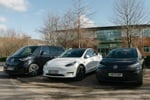The number of electric cars on UK roads will increase by 24% to 1.24m by the end of 2024, according to the latest estimates New AutoMotive.
The transport research organisation’s latest State of the Switch report said the jump will be down to the Zero Emissions Vehicle (ZEV) Mandate which came into force in January.
The mandate requires car manufacturers to meet an increasing percentage target of EV sales.
If every car manufacturer hits the sales target outlined in the legislation, the number of EVs could rise further to 1.3m.
The policy is expected to bring the price of some mass market EVs down by up to £10k as car makers race to meet this year’s target of 22%. While the 22% ratio is in place, not every manufacturer will have to hit that this year as they can mitigate EV sales mix ratios with a credit system.
However, AM understands some brands are incentivising retail networks to get that EV sales mix up and to help support customers with the right information to help them move into an EV where suitable.
Dealers have also shared concerns that the ZEV could create a forced EV market in 2024.
Other factors encouraging EV uptake include the 30 to 80% cheaper cost per mile when compared to petrol and diesel vehicles and the UK’s increasingly reliable charging infrastructure.
Other key findings from the report include predictions on how the cost of charging at home will fall a further 22% over 2024, while petrol and diesel prices are expected to stay steady.
The report also sets out a wide range of policy recommendations to help accelerate the UK’s transition to electric cars further.
These include launching a government backed calculator to help drivers work out the savings from switching to electric, and policies to encourage higher mileage drivers to switch to EVs.
Demise of the EV ‘overstated’
Ben Nelmes, New AutoMotive chief executive, said: “Reports of the demise of EVs are wildly overstated.
“With EV registrations at record levels, EV chargers rolling out at a rapid pace, and the ZEV mandate in full force - it’s clear we’re now in the midst of the EV revolution.
“We still have hurdles to overcome - EV misinformation is rife, and it’s now up to the Government and industry to dispel common EV myths and highlight the cost benefits of going electric with comparison tools.
“The price of public EV charging needs to come down to match home tariffs, and through simple policy changes we can make charging more affordable for all - not just those with off-street parking.
“Despite these setbacks, the direction of travel has been set.
“The UK should be proud of its world-leading EV policy, and if the recommendations outlined in our report are implemented, I’m confident we’ll see even more good news for the country’s EV transition.”
Owen Edwards, head of downstream automotive consulting at Grant Thornton, said that while BEV demand has hit a wall due to price being a barrier for mass market retail customers, demand will recover as manufacturers succesfully implement new production techniques that will dramatically reduce the cost to manufacturer EVs.
Brands like Tesla, BYD and Xpeng are already making BEVs differently using a technique called ‘giga pressing’, in combination with sophisticated robotics and automated systems.
The Model Y was the most popular fleet vehicle in the UK last year and is already made using this giga press method.
Edwards explained: “Normally the car manufacturers produce a monocoque chassis that has been around for over 100 years. It’s a shell you bolt everything onto and comes in around 100 parts.
“That’s not the most efficient way to produce a BEV. Giga pressing can take 40% of the footprint of the factory away. Tesla has already said it can reduce production costs by 50% by making BEVs this way.
“We would expect prices for BEVs to come down by around 30% overall as a result of giga pressing.”

















Login to comment
Comments
No comments have been made yet.